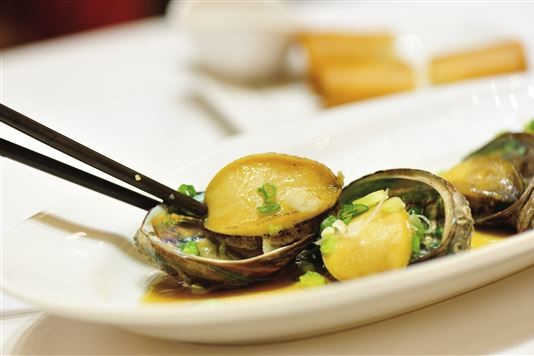What foods could you never eat?

After recent taste tests in which we first ate insects and squirrel meat, we ask what foods you could never bring yourself to eat.
What foods could you never eat? And do you have a rational explanation as to why?
Recent taste tests here at loveFOOD have included squirrel meat and insects, which caused a lot of people to cry foul on grounds such as "squirrels are fluffy and cute" and "insects are slimy". Good arguments?
Food I won’t touch
It squishes and slurps its way along the seafloor, dragging itself forward with that vile foot-thing. The nauseating antennae wave around like fleshy blades of grass, making weak swings through the water around it.
Oh, the inside of its shell might be resplendent – a beautiful ornament, some might say, and it’s prized as a material by certain craftsmen – but I’ll never forget the shuffling horror that lurks within.
Who on earth would ever want to eat abalone?
I find abalone disgusting to look at, and the thought of eating these overgrown sea snails sickens me, but it’s a popular delicacy in many parts of the world.
I consider myself a fairly adventurous eater on the whole, but couldn’t face abalone. Would you eat one?

How far can you justify your disgust?
For similar reasons as abalone, I’ve always thought of snails as pests and never food. I wouldn’t eat a slug – even considering the question makes me retch – and a snail is just a slug that was lucky enough to evolve protection. They are repulsive.
Having said all that, there are also notable lovers of the gastropod [Managing Ed: me for one]. In Spain and France, for instance, they still make very regular appearances on menus.
A lot of it is to do with our culture, of course, and it would be extremely ignorant to not mention that. If you’ve grown up eating snails, or something equally disgusting (in my humble opinion), then you’re not likely to be bothered by the thought. Snails are common and, to be frank, who would miss them? It’s only to some outsiders (I count myself here) that it seems horrible.
However, when it comes to the illegal but continuing trade in rare wildlife for medicinal and culinary use, how much can we allow for cultural differences?
A place where you can buy anything
A recent report from the Environmental Investigation Agency profiled the Golden Triangle Special Economic Zone (SEZ) in Laos, saying that it was “a free-for-all illegal wildlife supermarket.”
A Chinese company, Kings Roman Group, has a 99-year lease and 80% stake in the operation, while the Laos Government holds the remaining 20% stake. Within the 10,000 hectares of its leased land, the area includes a 3,000 hectare duty-free zone making up the SEZ.
The report says that within the SEZ there are restaurants that openly sell tiger bone wine, and it also contains disturbing photography of multiple tiger skins, trafficked into the zone and sold along with other products derived from poached tigers. Some meat is also sold which is marketed as tiger.
Investigators observed that the number of tigers at a farm within the SEZ had increased from six to 35 between June 2014 and February 2015, and plans are in place to increase this number to between 500 and 1,000.
Where do you draw the line?
Here’s an interesting question – would it be as wrong to eat tiger, if the species wasn’t endangered, as it would be to eat abalone if it were still being overfished to dangerously low stock levels? If it was farmed, would that make it alright?
To a large extent, I’m playing devil’s advocate here, and for the record: no, I would not eat a tiger (bar tiger prawns) or other endangered species. Nor do I personally find it acceptable that people do so.
Abalone, to me, seem harder to defend than a majestic tiger (because they’re filthy underwater slugs) – but they too have suffered in the past from overfishing and several species are endangered but still prized on the black market. Do the cultural differences to an extent justify the consumption of rare, nice-looking animals, or – even if they weren’t endangered – can we never accept it?
If there were loads of tigers, and they were consumed sustainably and the associated legal restrictions were lifted, could we cope with that? Or would we be just as outraged?
Do you think Matt is a coward and should tuck into abalone? Could we ever accept the consumption of an animal as beautiful as a tiger? What foods could you never eat? Weigh in with your thoughts using the Comments below.
You might also like:
Comments
Be the first to comment
Do you want to comment on this article? You need to be signed in for this feature